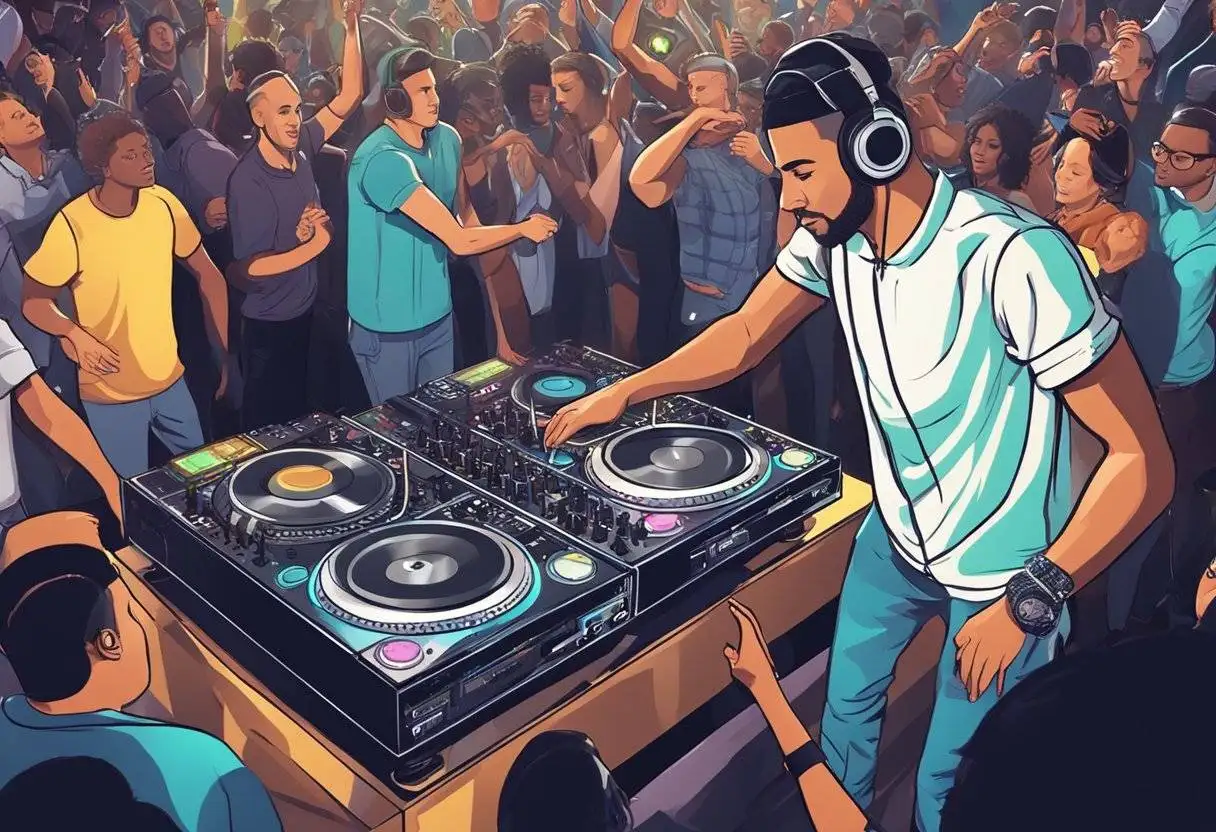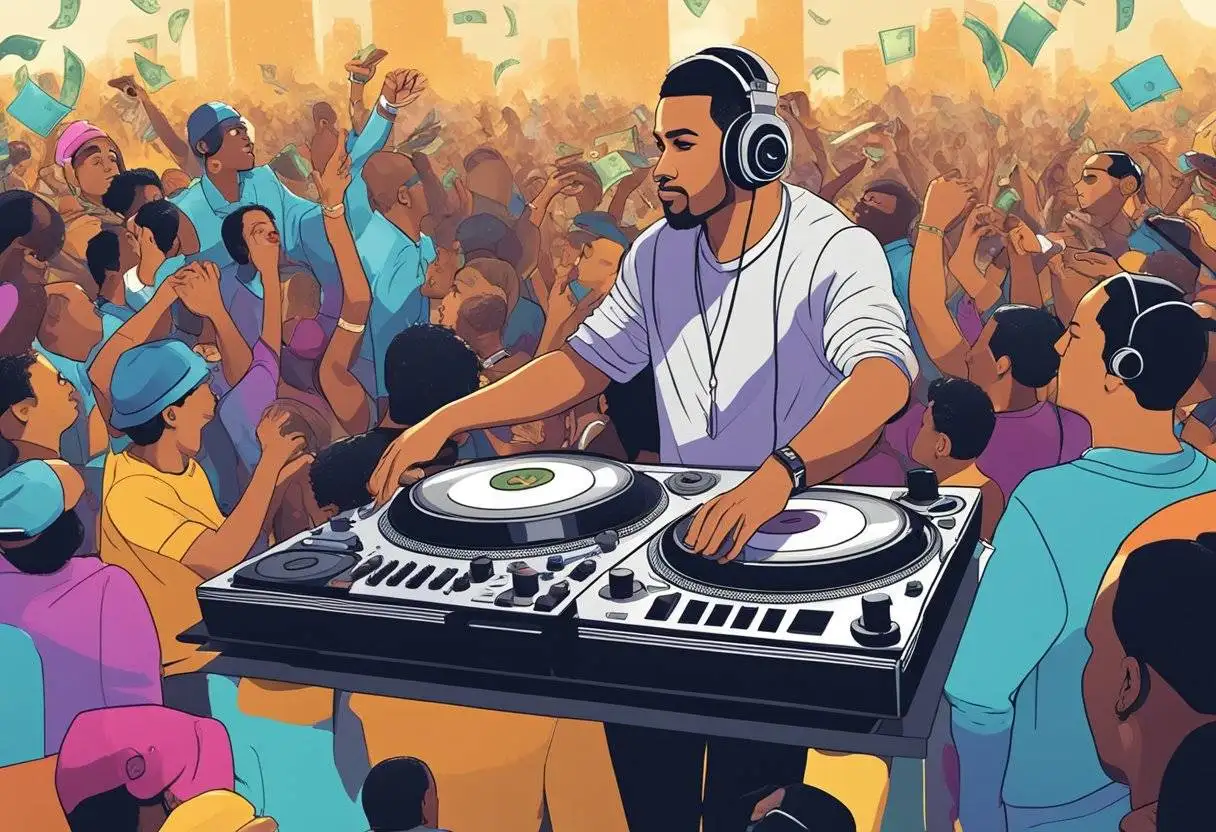Navigating the financial landscape of the DJ profession can be as varied and dynamic as the music they play. The income of DJs largely comes from the mastery of their craft, the events they perform at, and the reputation they build over time. From club residencies and weddings to music festivals and private parties, each gig contributes to a DJ’s earnings profile. Additionally, many DJs augment their performance fees with other revenue streams such as producing tracks, teaching DJ skills, and brand sponsorships, which can provide a significant boost to their financial stability.

Building a successful career as a DJ requires both musical talent and entrepreneurial savvy. Top-earning DJs often have a thorough understanding of their audience, leading to strategic gig selection and the creation of a personal brand that resonates with fans. Beyond live events, the rise of digital platforms offers new opportunities for DJs to monetize their work through the distribution of recorded sets, online performances, and collaborations. This multichannel approach not only diversifies their income but also helps in establishing a global presence, essential for longevity in the industry.
Key Takeaways
- DJs generate income through performances, production, and brand partnerships.
- A well-crafted personal brand and strategic gig selection are vital for financial success.
- Diversification across digital platforms enhances earning potential and global reach.
Paths to Profitability in DJing
In DJing, earning potential is multifaceted, with income stemming from live performances, digital platforms, and music production. Establishing multiple revenue streams is imperative for financial growth in this competitive landscape.
Club and Festival Gigs
As a DJ, playing at clubs and festivals can lead to substantial earnings, with pay varying widely based on your experience and following. Performing at hotspots like Las Vegas or Ibiza often means higher compensation due to the large audience sizes and prestige. Being a club DJ or landing a headlining spot at a major festival can significantly increase your net worth.
Weddings and Private Events
DJing at weddings, private parties, and corporate events offers a steady source of income. Wedding DJs cater to a couple’s big day, while private event bookings for birthday parties and corporate functions provide a more intimate venue. Rates for these events are typically fixed, offering a reliable pay scale for DJs.
Online Revenue Streams
I benefit from online platforms by engaging with an audience through a YouTube channel, Twitch streaming, or podcasting. These platforms not only diversify my income through advertising and subscriptions but also enhance my exposure in the music industry.
Music Production and Sales
By producing music and executing smart music sales strategies, I tap into diverse revenue like licensing, royalty-free music, and stock music sales. Self-releasing music can also be profitable, with platforms available for releasing music directly to fans, cutting out the middleman.
Promotional Activities and Sponsorships
I leverage sponsorships and networking for financial gain. Creating tutorials or offering product consulting services are ways I further monetize my expertise. These activities bolster my reputation and can lead to lucrative partnerships, contributing to my overall revenue streams.
Professionals in the Spotlight

In my experience analyzing the music industry, I’ve observed that the earning potential for superstar DJs can be substantial. Factors such as their status in the industry, their ability to network, and their representation by savvy agents and labels all play crucial roles in determining their success and income.
Earning Profiles of Top DJs
Top-tier DJs like Calvin Harris, Tiësto, Steve Aoki, and The Chainsmokers have established themselves as prominent figures within the music scene. According to financial reports, these individuals often achieve an annual salary that catapults them into the millionaire category. For instance, Calvin Harris has been reported to have a net worth that reflects his status as one of the highest-paid artists in the electronic dance music (EDM) realm. Networking within elite circuits and partnering with major promoters has amplified their revenue streams, from live shows to music production.
- Steve Aoki: Known for his energetic performances and entrepreneurial ventures, adding a unique angle to his earning profile.
- Tiësto: A staple in the DJ world with a robust global following, generating income from multiple sources in the industry.
- David Guetta: Melds pop and electronic music, widening his audience and boosting his fiscal standing.
- The Chainsmokers: The duo’s crossover appeal in both EDM and pop music charts has bolstered their earning potential.
The Role of Agents and Labels
My exploration into the DJ profession has revealed that agents and labels are pivotal in sculpting a DJ’s career trajectory. The savvy agents negotiating lucrative deals and endorsements can significantly increase a DJ’s annual revenue. Labels, on the other hand, provide the infrastructure for distribution and marketing, essential for the commercial success that can heighten a DJ’s demand and salary. According to the Bureau of Labor Statistics, agents and managers of artists play a significant part in the financial outcomes for professionals in the entertainment sector, including DJs. Strategic partnerships with these entities can lead to higher visibility in the saturated music industry, creating more opportunities for income growth through touring, merchandising, and collaborations.
Foundations for DJ Financial Success

To achieve financial prosperity as a DJ, it’s crucial to invest in quality equipment, cultivate a distinctive brand coupled with a dedicated following, and continuously refine your skills and experience. Each of these pillars plays a vital role in a DJ’s ability to generate stable income.
Essential DJ Equipment
As a DJ, my performance is only as good as my tools, which means investing in the right equipment is non-negotiable. Starting with the basics, I need reliable turntables or controllers to mix music. High-quality mixers are essential for flawless sound blending, while a sturdy laptop serves as the central hub for my digital sound library. Additionally, professional lighting equipment can transform a gig, enhancing the audience’s experience and thus, potentially increasing my revenue.
Building a Strong Brand and Following
Creating a recognizable brand is about more than just my music; it’s about forging an identity that resonates with my audience. This means consistent and engaging branding across all platforms, including social media, which is a powerful tool for gaining exposure and building a following. By sharing my story, my successes, and even my setbacks, I establish authenticity, which in turn, fosters a loyal community. This following becomes the backbone of my profession, as their support translates to higher attendance at gigs, increased streaming numbers, and sometimes even viral moments that skyrocket my exposure.
Developing Skills and Experience
Earning and sustaining income as a DJ hinges on the depth of my skills and the breadth of my experience. This spans from understanding the nuances of music genres to crowd-reading abilities, and technical prowess with a variety of DJ equipment. Continuous education and practice help refine these skills, which are crucial for securing diverse gigs, such as club events, weddings, or radio slots. The more versatile and experienced I am, the more opportunities I attract—from club DJ slots to wedding DJ engagements, and beyond. Each performance is an opportunity to both earn and learn, building my reputation as a capable and reliable disc jockey.
Diversification and Industry Trends
In my pursuit of financial stability as a DJ, I’ve learned that diversifying income and staying abreast of industry trends is crucial.
Exploring Alternative DJ Income Avenues
I’ve found that traditional gigs, while foundational, are not the sole revenue sources. Product creation, such as merchandise sales, offers tangible goods tied to my personal brand, providing fans with a way to show their support beyond the dance floor. Additionally, ghost producing for other artists opens up opportunities in the broader music industry, letting me leverage my production skills.
Adapting to the Evolving Music Territory
The digital age demands adaptation. I engage with fans via podcasting and syndicating radio shows, expanding my reach beyond live sets. This pivot caters to a global audience and bolsters my reputation. Similarly, embracing various music genres, from electronic dance music to hip hop, enhances my versatility and marketability.
Location and Market Influence on Income
Understanding that location matters, I’ve observed how some cities value certain genres more than others. A resident DJ spot in a bustling nightclub can lead to regular income, while hitting the festival circuit might promise larger, yet less frequent, payday bursts. As I reflect on my earnings, the interplay of venue type, market demands, and my ability to adapt all significantly affect my net worth.
Each avenue requires different levels of investment and offers varying degrees of return, but staying informed and agile is the key to maximizing my financial potential in the ever-evolving DJ landscape.
Frequently Asked Questions

In my experience, understanding the economic landscape for DJs is just as crucial as the music they play. Below, I address some of the most common questions related to DJ income and profitability.
What are common sources of income for DJs?
My income streams as a DJ typically include club performances, private events, producing tracks, and offering lessons. Diversification is key for my financial stability.
What is the average income for a DJ per gig?
The average income per gig can vary greatly but typically ranges from a few hundred to thousands of dollars. It largely depends on factors such as event size, location, and my notoriety as a DJ.
Do DJs have opportunities for passive income, and if so, what are they?
Yes, there are passive income avenues like royalties from original music, monetizing mixes online, and earning from teaching or tutorial content where my presence isn’t required constantly.
In what ways can a DJ increase their profitability?
To increase my profitability, I focus on building a strong brand, expanding my network, improving skills, and diversifying my income sources, such as venturing into music production or merchandise sales.
What are typical earning ranges for beginner versus experienced DJs?
Beginners might earn modest amounts, often lower than $100 per gig, but experienced DJs with established reputations can command several thousand dollars per event.
What factors influence how much a DJ can charge for their services?
My rates as a DJ are influenced by experience, demand, the type of event, and the geographic location. Additionally, unique skills like turntablism or a strong following can justify higher charges.
